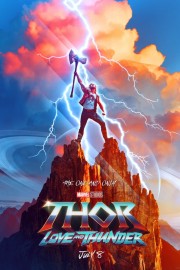Thor: Love and Thunder
When he made “Thor: Ragnarok,” Taika Waititi fused a story about the apocalypse with a bright, energetic sense of fun that meant that, were he to return to the franchise, he set a relatively high standard for himself. It’s probably inevitable that lightning doesn’t really strike twice for him with “Love and Thunder,” but I like what it’s going for, and I feel like it hits the big moments it should hit.
At the end of “Avengers: Endgame,” Thor was jetting around the universe with the Guardians of the Galaxy. Naturally, that means that this needs dealt with the next time we see these characters. With “Guardians of the Galaxy, Vol. 3” a year away, that leaves “Love and Thunder” to handle that legwork. Something feels off here, though; we essentially meet them mid-adventure, and with Korg as narrator. This is Thor’s story, and the Guardians are a distraction; they are removed from the equation in short order, but that doesn’t make it any less awkward to see them here.
The heart of “Thor: Love and Thunder” centers around Jane Foster (Natalie Portman), the scientist girlfriend of Thor. This film presents the only narrative that could bring Portman back to the MCU after she was disappointed with the replacing of Patty Jenkins as director on “Thor: The Dark World.” In the comics, Jane Foster takes on the mantle of Thor when she is diagnosed with terminal cancer; she hopes that the magic of the Norse God will save her. This is part of why the Guardians being in the first act is a distraction- we want the central story to pick up as quickly as possible, because that’s going to be part of the film’s emotional core. Granted, we also start to establish the character of Gorr the God Butcher (Christian Bale), who is exacting revenge on the Gods after his people’s prayers were not answered, but the exposition is just not as nimble here as it was in “Ragnarok.”
Where is Thor (Chris Hemsworth) in all of this? His ability to vanquish enemies with brutal efficiency is masking a sense of loss he still feels for his family, Asgard and Jane. Korg’s narration is a framing device for the film, but it’s a clunky one given the structure of the narrative. Jane being in the equation as The Mighty Thor adds confusion to his feelings, and his attempts to move on from his sadness.
Structurally, the screenplay by Waititi and Jennifer Kaytin Robinson is a mess. Waititi’s ability to keep things moving is strong- hence the film’s 119 running time- but he has a hard time keeping it moving on a straight line. Part of that is having to deal with the Guardians as set up in “Endgame,” but it also has to do with the fact that he doesn’t seem to have a handle on how to mix the fun and emotional when the stakes are personal, rather than apocalyptic. He knows how to have fun- the scene with Zeus (Russell Crowe) is a blast- but Portman is left with doing the heavy lifting with Foster’s story. She handles it well, though, and her chemistry with Hemsworth remains strong.
The “Thor” franchise has been so uneven that, for all its faults, “Love and Thunder” is still my second favorite “Thor” film after “Ragnarok.” The use of Guns N’ Roses on the soundtrack was always going to work on me; the way composer Michael Giacchino was able to prior Thor film themes was a pleasant surprise; I like the thematic parallels between Jane and Gorr; the first time Thor, Jane and Valkyrie (Tessa Thompson, underused here) face off against Gorr is a terrific use of different visual ideas than we’ve seen before; and, in the end, the key emotions land. Phase 4 of the MCU continues to be a wildly mixed bag of tones and ideas, but in the end, I continue to enjoy how wild these mixes have been.










